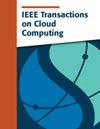GHPFL:通过优化带宽利用率推进个性化边缘学习
IF 5.3
2区 计算机科学
Q1 COMPUTER SCIENCE, INFORMATION SYSTEMS
引用次数: 0
摘要
联邦学习(FL)被越来越多地用于在不泄露客户私有数据的情况下将培训中的客户知识结合起来。为了提高不同参与者的学习成绩,个性化学习最近被提出。然而,考虑到客户端的非独立和同分布(非iid)数据和有限的带宽,模型性能可能会受到影响。实际上,彼此靠近的客户机往往具有相似的数据分布。在本工作中,我们在客户端-边缘-服务器FL中训练个性化的基于边缘的模型,在考虑数据分布差异的同时,充分利用有限的带宽资源。为了使训练既高效又准确,一个直观的思路是尽可能多地从其他边学习有用的知识,减少非iid数据带来的准确率损失。因此,我们设计了分组分层个性化联邦学习(GHPFL)。在此框架中,每个边缘与多个客户端建立物理连接,而服务器与边缘进行物理连接。它将边缘聚类成组,并为同步建立客户端边缘逻辑连接。这是基于节点主动识别的数据相似性,以及底层物理拓扑。我们进行了大规模的评估,以证明GHPFL优于其他方案。本文章由计算机程序翻译,如有差异,请以英文原文为准。
GHPFL: Advancing Personalized Edge-Based Learning Through Optimized Bandwidth Utilization
Federated learning (FL) is increasingly adopted to combine knowledge from clients in training without revealing their private data. In order to improve the performance of different participants, personalized FL has recently been proposed. However, considering the non-independent and identically distributed (non-IID) data and limited bandwidth at clients, the model performance could be compromised. In reality, clients near each other often tend to have similar data distributions. In this work, we train the personalized edge-based model in the client-edge-server FL. While considering the differences in data distribution, we fully utilize the limited bandwidth resources. To make training efficient and accurate at the same time, An intuitive idea is to learn as much useful knowledge as possible from other edges and reduce the accuracy loss incurred by non-IID data. Therefore, we devise Grouping Hierarchical Personalized Federated Learning (GHPFL). In this framework, each edge establishes physical connections with multiple clients, while the server physically connects with edges. It clusters edges into groups and establishes client-edge logical connections for synchronization. This is based on data similarities that the nodes actively identify, as well as the underlying physical topology. We perform a large-scale evaluation to demonstrate GHPFL’s benefits over other schemes.
求助全文
通过发布文献求助,成功后即可免费获取论文全文。
去求助
来源期刊

IEEE Transactions on Cloud Computing
Computer Science-Software
CiteScore
9.40
自引率
6.20%
发文量
167
期刊介绍:
The IEEE Transactions on Cloud Computing (TCC) is dedicated to the multidisciplinary field of cloud computing. It is committed to the publication of articles that present innovative research ideas, application results, and case studies in cloud computing, focusing on key technical issues related to theory, algorithms, systems, applications, and performance.
 求助内容:
求助内容: 应助结果提醒方式:
应助结果提醒方式:


